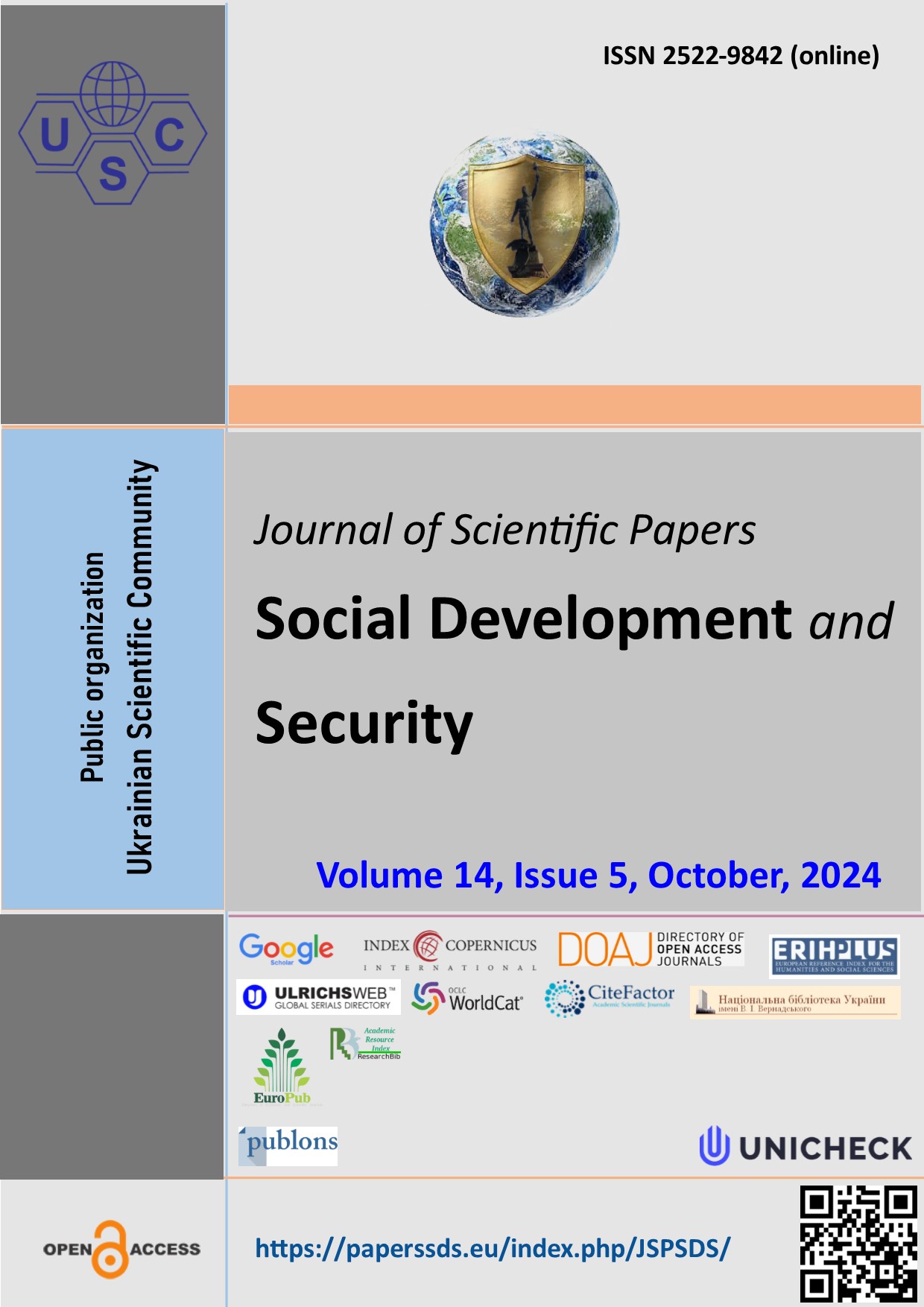Human capital development in the context of demographic changes and digitalization of the economy
Abstract
Purpose: Theoretical substantiation, development of methodological principles and scientific-practical recommendations for the formation of a human capital development system under demographic changes and digitalization of the economy.
Method: a systematic approach, econometric modeling, comparative analysis, statistical analysis.
Practical value of the research: A methodological approach has been developed to assess the impact of demographic changes on human capital formation, which takes into account the relationship between population age structure and labor productivity in the digital economy. A mechanism for optimizing investments in human capital development and scientific-practical recommendations for adapting the education system to the requirements of the digital economy, considering the characteristics of different age groups, has been proposed.
Value of the research: Enhanced understanding of interaction mechanisms between demographic and technological factors of human capital development, advanced methodological tools for assessing the impact of demographic changes, and developed new approaches to optimizing human capital development in the digital economy. Empirically proven possibility of compensating for the negative impact of demographic aging through the development of digital competencies.
Type of article: research.
Downloads
References
Arshed, N., Rauf, R., & Bukhari, S. (2024). Empirical Contribution of Human Capital in Entrepreneurship. Global Business Review, 25(3), 683-704. https://doi.org/10.1177/0972150920976702.
Bai, C., Zhang, Y., Wang, C., Xue, Q., & Feng, C. (2024). Flattening of government hierarchies and growth of farmers' income. Journal of Asian Economics, 95, 101836. https://doi.org/10.1016/j.asieco.2024.101836
Baranovskyi, M. O., Smal, V. V., & Baranovska, O. V. (2021). Old industrial regions of Ukraine: Problems and trends of contemporary development (on the cases of Donetsk and Luhansk oblasts). Ukrainian Geographical Journal, 1(113), 34-43. https://doi.org/10.15407/ugz2021.01.034
Brida, J.G., Alvarez, E., Cayssials, G. and Mednik, M. (2024), "How does population growth affect economic growth and vice versa? An empirical analysis", Review of Economics and Political Science, 9 (3), 265-297. https://doi.org/10.1108/REPS-11-2022-0093
Calinescu, T., & Zelenko, O. (2020). Growth Regulators for Viable Production in Conditions of Formation the Responsible International Cooperation. E3S Web of Conferences, 159, 03004. https://doi.org/10.1051/e3sconf/202015903004
Cassetti, V., Powell, K., Barnes, A., & Sanders, T. (2024). How can asset-based approaches reduce inequalities? Exploring processes of change in England and Spain. Health Promotion International, 39(2), daae017. https://doi.org/10.1093/heapro/daae017
Chisale, H. L. W., Chirwa, P. W., Kamoto, J. F. M., & Babalola, F. D. (2024). Determinants of adaptive capacities and coping strategies to climate change related extreme events by forest dependent communities in Malawi. Wellbeing, Space and Society, 6, 100183. https://doi.org/10.1016/j.wss.2024.100183
Chishti, M. Z., Salam, M., Xaisongkham, S., & Du, A. M. (2024). Influence of green ICT and socioeconomic factors on sustainable development: Evidence from Chinese provinces. Research in International Business and Finance, 73, 102624. https://doi.org/10.1016/j.ribaf.2024.102624
Chornous, G. O., & Gura, V. L. (2020). Integration of Information Systems for Predictive Workforce Analytics: Models, Synergy, Security of Entrepreneurship. European Journal of Sustainable Development, 9(1), 83. https://doi.org/10.14207/ejsd.2020.v9n1p83
DESI (2024). The Digital Economy and Society Index. https://digital-strategy.ec.europa.eu/en/policies/desi
Ding, Q., Huang, J., Chen, J., & Tao, D. (2023). Internet development and renewable energy technological innovation: Does institutional quality matter? Renewable Energy, 218, 119344. https://doi.org/10.1016/j.renene.2023.119344.
Duran, H. E., Elburz, Z., Kourtit, K., & Nijkamp, P. (2023). Region-specific turning points in territorial economic resilience: a business cycle approach to Turkey. Area Development and Policy, 9(1), 45–66. https://doi.org/10.1080/23792949.2023.2197033
Eurostat (2024). Digitalisation in Europe – 2024 edition. Available from : https://ec.europa.eu/eurostat/web/interactive-publications/digitalisation-2024
Han, Q., Kumar, R., & Kumar, A. (2024). Climate change and human migration: Perspectives for environmentally sustainable societies. Journal of Geochemical Exploration, 256, 107352. https://doi.org/10.1016/j.gexplo.2023.107352.
Hondroyiannis, G., Papapetrou, E. & Tsalaporta, P. (2024), The effect of population aging on environmental degradation: new evidence and insights. Journal of Economic Studies, 51 (2), 471-484. https://doi.org/10.1108/JES-05-2023-0235
International Telecommunication Union, ITU (2024). National Digital Skills Workshop – Accelerating the Digital Uganda Vision through Skills Assessment and Development. Available from : https://www.itu.int/en/ITU-D/Regional-Presence/Africa/Pages/EVENTS/2024/uganda-digital-skills-workshop.aspx
Kasianenko, V., Kasianenko, T., & Kasaeva, J. (2020). Investment potential forecast and strategies for its expansion: case of Ukraine. Investment Management and Financial Innovations, 17(1), 329-347. https://doi.org/10.21511/imfi.17(1).2020.28
Kozlovskyi, S., Pasichnyi, M., Lavrov, R., Ivanyuta, N., & Nepytaliuk, A. (2020). An Empirical Study of the Effects of Demographic Factors on Economic Growth in Advanced and Developing Countries, Comparative Economic Research. Central and Eastern Europe, ISSN 2082-6737, Łódź University Press, Łódź, 23 (4), 45-67, https://doi.org/10.18778/1508-2008.23.27
Kuklin, O., Pustoviit, R., Azmuk, N., Gunko, V., & Moisieieva, N. (2021). Institutional and socio-economic factors of the educational trend in Ukraine in the context of European integration. Naukovyi Visnyk Natsionalnoho Hirnychoho Universytetu, (1), 165-170. https://doi.org/10.33271/nvngu/2021-1/165
Li, C., Chen, H., Xie, W., & Wang, P. (2024). Tax incentives for human capital accumulation and enterprise innovation quality: Evidence of a quasi-natural experiment in China. Finance Research Letters, 70, 106342. https://doi.org/10.1016/j.frl.2023.106342
Londar, S., Lytvynchuk, A., Versal, N., Posnova, T., & Tereshchenko, H. (2020). Investment in Human Capital Within the Creative Economy Formation: Case of the Eastern and Central Europe Countries, Comparative Economic Research. Central and Eastern Europe, ISSN 2082-6737, Łódź University Press, Łódź, 23(4), 129-148, https://doi.org/10.18778/1508-2008.23.31
Lutz, W. (2024). Overshooting global warming and overshooting fertility decline. Beyond the smooth stabilization paradigm. Vienna Yearbook of Population Research 22 1-8. https://doi.org10.1553/p-35m2-3ce3/
Mburu, M.N., Mburu, J., Nyikal, R. et al. Assessment of socio-economic determinants and impacts of climate-smart feeding practices in the Kenyan dairy sector. Mitig Adapt Strateg Glob Change 29, 32 (2024). https://doi.org/10.1007/s11027-024-10131-7.
Neboha, T., Zapsha, H., Kuznetsova, M., Golikova, O., & Striy, L. (2024). Development of the human capital in the context of corporate personnel training digitalization. E3S Web of Conferences, 558, 01020. https://doi.org/10.1051/e3sconf/202455801020
Nexford University (2024). The Future of Jobs In 2024 And Beyond. Available from : https://nexford.edu/insights/future-of-jobs
Neycheva, M. (2024). Exploring the factors of firm-provided continuing education and training: A systematic literature review. European Journal of Educational Research, 13(3), 1185-1197. https://doi.org/10.12973/eu-jer.13.3.1185.
OECD (2024). Digital Economy Outlook. Available from : https://www.oecd-ilibrary.org/science-and-technology/oecd-digital-economy-outlook_f0b5c251-en
Quito, B., del Río-Rama, M. l.C., Peris-Ortiz, M. et al. Spatial-Temporal Determinants of Income Inequality in the Cantons of Ecuador between 2010 and 2019: a Spatial Panel Econometric Analysis. J Knowl Econ 15, 7744–7768 (2024). https://doi.org/10.1007/s13132-023-01373-y
Rossi, L., Pasca, M. G., Arcese, G., & Poponi, S. (2024). Innovation, researcher and creativity: A complex indicator for territorial evaluation capacity. Technology in Society, 77, 102545. https://doi.org/10.1016/j.techsoc.2024.102545
Sobiech Pellegrini, I., Chmura, R., Sawulski, J., & Mętrak, T. (2024). Can the improvements in human capital quality mitigate the negative impact of ageing on growth? Evidence from selected EU countries. Economics of Transition and Institutional Change. https://doi.org/10.1111/ecot.12430
Vovk, V., Denysova, A., Rudoi, K., & Kyrychenko, T. (2021). Management and legal aspects of the symbiosis of banking institutions and fintech companies in the credit services market in the context of digitization. Estudios de Economia Aplicada, 39(7). https://10.25115/eea.v39i7.5013
Wang, J., Liu, Y., Wang, W., & Wu, H. (2024). Does artificial intelligence improve enterprise carbon emission performance? Evidence from an intelligent transformation policy in China. Technology in Society, 79, 102751. https://doi.org/10.1016/j.techsoc.2024.102751
Webb, D. (2024). Critical Periods in Cognitive and Socioemotional Development: Evidence from Weather Shocks in Indonesia, The Economic Journal, 134 (660), 1637–1665, https://doi.org/10.1093/ej/uead105.
World Bank Group. (2024, March 4). Digital Adoption Index. Available from : https://www.worldbank.org/en/publication/wdr2016/Digital-Adoption-Index
World Economic Forum Annual Meeting (2024). Available from : https://www.weforum.org/events/world-economic-forum-annual-meeting-2024/
Zhou, Yuanren, Menggen Chen, Xiaojie Liu, and Yun Chen. 2024. A New Framework, Measurement, and Determinants of the Digital Divide in China. Mathematics, 12(14), 2171. https://doi.org/10.3390/math12142171
Abstract views: 116 PDF Downloads: 68
Copyright (c) 2024 Svіtlana Bondarenko

This work is licensed under a Creative Commons Attribution 4.0 International License.
The authors agree with the following conditions:
1. Authors retain copyright and grant the journal right of first publication (Download agreement) with the work simultaneously licensed under a Creative Commons Attribution License that allows others to share the work with an acknowledgment of the work's authorship and initial publication in this journal.
2. Authors have the right to complete individual additional agreements for the non-exclusive spreading of the journal’s published version of the work (for example, to post work in the electronic repository of the institution or to publish it as part of a monograph), with the reference to the first publication of the work in this journal.
3. Journal’s politics allows and encourages the placement on the Internet (for example, in the repositories of institutions, personal websites, SSRN, ResearchGate, MPRA, SSOAR, etc.) manuscript of the work by the authors, before and during the process of viewing it by this journal, because it can lead to a productive research discussion and positively affect the efficiency and dynamics of citing the published work (see The Effect of Open Access).
















